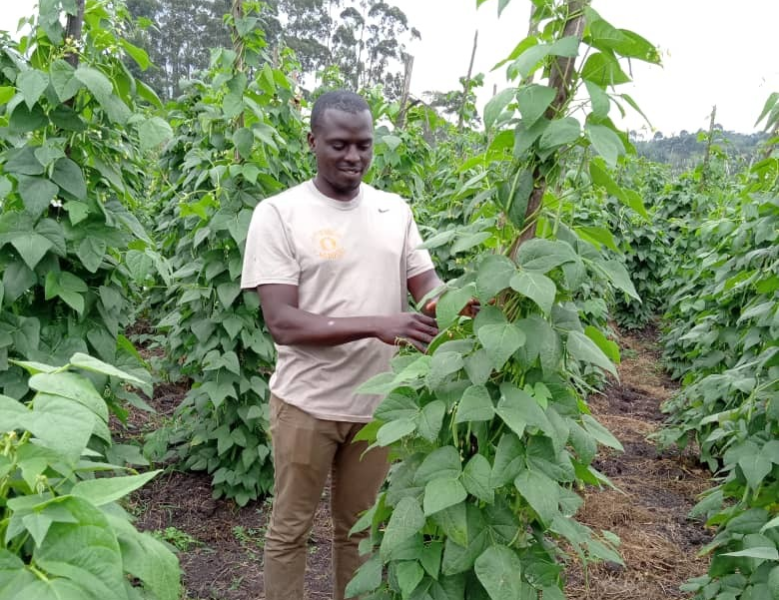Press and News Responding to the effects of COVID-19 on smallholder bean farmers in Kenya and Uganda

In Sub-Saharan Africa, the COVID-19 pandemic has exacerbated existing smallholder farmers’ vulnerabilities. In Kenya and Uganda, the Alliance and its partners are building networks and increasing access to market and information to strengthen farmers’ resilience.
Before the onset of the COVID-19 pandemic, smallholder farmers experienced inefficiencies in the bean value chain across Sub-Saharan Africa due to climate change, pests and diseases, unstructured markets, as well as limited access to information and agricultural inputs. With the COVID-19 pandemic and the ensuing containment measures, these inefficiencies have been exacerbated. However, the pandemic has also generated new potential opportunities for partnerships, alliances, and funding to mitigate these inefficiencies and create a more sustainable bean value chain.

Young farmer in his common bean farm in Kabonera village, Masaka district, Uganda. Credit: E. Nchanji
In Kenya, the first case of COVID-19 was announced in March 2020, when smallholder bean farmers had already planted their crops, with few farmers still in the verge of planting. In this context, the Pan Africa Bean Research Alliance (PABRA), led by the Alliance of Bioversity International and CIAT, and the Kenya Agricultural and Livestock Research Organization (KALRO) have developed an innovative seed revolving fund to supply biofortified certified seeds (Nyota, Angaza, and Faida) to various farmers. The initiative started in September 2019.
Through the fund, farmers could access and test certified seeds while implementing sustainable agronomic practices. This allowed farmers to experience increased yield and profitability. To ensure that bean yields translated into profits, farmers were linked to existing bean processing companies.
For instance, after harvest, rural women from the Ushirikiano Women Self Help Group in Nakuru were able to sell their grains to ‘Smart Logistics,’ a woman-owned enterprise that produces pre-cooked beans and bean snacks from high-iron and zinc bean varieties. Smart Logistics bought the bean grains at a premium price of USD 60 (Ksh. 6000) for 90 kg, instead of the market price of USD 50 (Ksh. 5000) per 90kg. Excess seeds from the revolving fund were made available to farmers who had limited access to seeds, due to the lock-down imposed by the Government to curb the spread of COVID-19.
In Uganda, working with the National Agricultural Research Organization (NARO) and the Community Enterprises Development Organization (CEDO), PABRA provided farmers with quality seeds, credit, and access to national and regional markets. COVID-19 struck the country when farmers were preparing their fields for planting. Compared to Kenya, the national containment measures were more severe, creating seed gaps, higher labor and transport costs, as well as higher market prices – as shown by a study conducted by PABRA.
As CEDO was not able to reach all farmers due to increased transport costs, some farmers resorted to using their saved seeds or grow different crops for food and income generation. In the second season, CEDO increased its number of agents to reach more farmers and provide them with access to inputs and markets.
As part of these COVID-19 response efforts, PABRA is also promoting the adoption of digital technology among farmers in Uganda and Tanzania, so that they can reach off-takers and processors through apps such as WhatsApp and the Mastercard Farmer’s Network app, which are commonly used in both countries. By increasing public-private partnerships, PABRA and its partners have also facilitated access to seeds. For instance, in Kenya, seed companies have started using ‘boda boda‘ and e-commerce to supply seed to farmers, who can easily place orders of seeds and other inputs required for the season.
Another important component of our COVID-19 response in Uganda and Tanzania is the increased use of mechanization. Through COVID-19 responsive funding from the Swiss Agency for Development Cooperation, the International Development Research Centre (IDRC) and Global Affairs Canada, we are purchasing agricultural equipment, like threshers and automatic sprayers, that reduce production costs and help create employment opportunities for youths.
